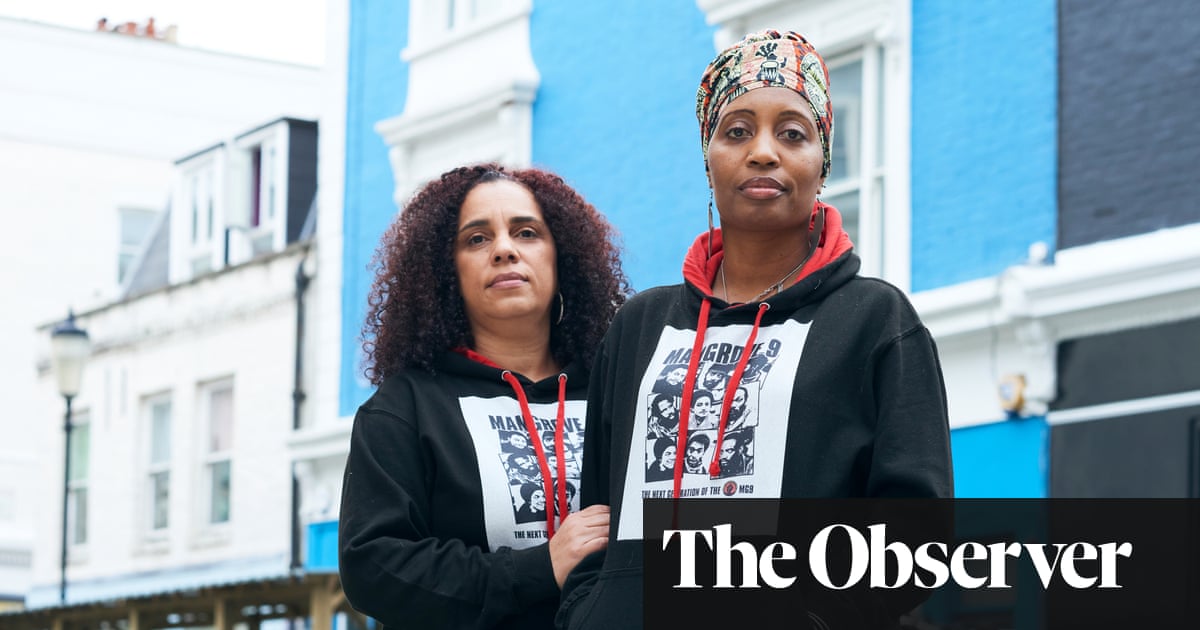Daughters of the Mangrove Nine: ‘That passion in our parents was instilled in us’ - 5 minutes read

Yinka Inniss Charles, left, and Jamilla Bolton-Gordon, whose fathers Elton Anthony Carlisle Inniss and Rhodan Gordon were members of the Mangrove Nine. Photograph: Suki Dhanda/The Observer Race Daughters of the Mangrove Nine: ‘That passion in our parents was instilled in us’ Fifty years after their dads stood trial in a landmark court case, Yinka Inniss Charles and Jamila Bolton-Gordon talk about police harassment, their fathers’ legacy and their ongoing work against injustice
A landmark case, then, mostly forgotten about outside west London, until film-maker Steve McQueen made his film about it, Mangrove, for his 2020 Small Axe series of dramas about key events in black British lives. Nowadays, the Mangrove Nine are no longer just local heroes; they are covered in the national curriculum and have come to wider attention in a new age of black activism and protest. As Jamaican poet and activist Linton Kwesi Johnson remarks in recent BBC documentary Black Power: A British Story of Resistance: “I think the youngsters of the BLM movement need to apprise themselves of what has gone before, so that they can draw some lessons from the battles we have fought and won.”
It’s fair to say that Yinka Inniss Charles draws lessons from that time, as does Jamila Bolton-Gordon. Both women grew up in Notting Hill (as did I – Yinka has long been a family friend). Like a lot of people from that area, they are fiercely proud of their roots, and are active in campaigning and protesting against ongoing injustice and inequality. Their fathers, Elton Anthony Carlisle Inniss and Rhodan Gordon, were both members of the Mangrove Nine, and the women’s friendship and outlook on life have been shaped by their dads’ experiences. The march their fathers went on back in August 1970, when they were arrested, sought to draw attention to the repeated and aggressive raids on the Mangrove restaurant; raids carried out for no other reason than, according to one person interviewed in Black Power, “policing the Mangrove out of business”. Johnson says: “It was clear to the black youth of my generation that the Metropolitan police had declared war on us.” The area has, over the years, been a hostile and sometimes violent environment for black people.
Her father was born in 1947 and came from a wealthy family in Morvant, Trinidad. “There were lawyers and judges in the family. They sent the oldest of each group of kids over to London to go to school. Later he met my mum [who is from Cork in southern Ireland] at one of the clubs they used to go to.” (These included the Rio, owned by Frank Crichlow, who would later open the Mangrove.) “He was a musician and very much into African culture. That’s why I got the [Nigerian] name Yinka.”
There was, though, more safety in crowds, and the close-knit community stuck together. “Everyone was kind of friends. Going to the same clubs. My dad had been beaten up by the police before Mangrove – that was normal, and although they [the protesters] came together for the Mangrove protest, they had been coming together already, because they had had enough of young black boys being abused by police. They all used to hang around at Metro [a youth club on Lancaster Road]. They were protecting each other from the police. Trying to find a way to get away from them. Young black men who had come over to London as teenagers.”
“My mum met my dad as a teenager, she came here in the 60s from Jamaica. My dad came from Grenada in 1960, when he was 22. By then, he already had a political point of view that had been awoken in him in Grenada. Mum would see him talking in Hyde Park, at Speakers’ Corner,” she says. “Dad quickly became a community activist, specialising in law, immigration, housing and education. He developed charitable and entrepreneurial businesses.” Back-a-Yard was a Caribbean restaurant in Portobello Road; later, he opened the Black People’s Information Centre – an advice centre that provided much of the Mangrove Nine’s legal support (the family lived upstairs). “The legacy he left for the area is the black youth hostel and housing association, Westway Housing Ltd, that he helped to found.”
She says it was normal in the late 70s and early 80s to see the police harassing black people in the street. “Arresting people for nothing. We got used to it. Living in Ladbroke Grove, particularly when I was little, I just remember having mixed emotions, because it could be an exciting and uplifting place as well. But if you had a black father, he was going to be harassed and abused by the police. Yes, there were some bad things going on in the area, but people were also trying to run legitimate businesses that were being targeted 24/7. You weren’t allowed to do business like a white person and just be left alone.”
Source: The Guardian
Powered by NewsAPI.org
Whether you prefer a casual game to unwind or a competitive challenge, bandle has a mode for you. From timed challenges to unlimited play, the game caters to all types of players.